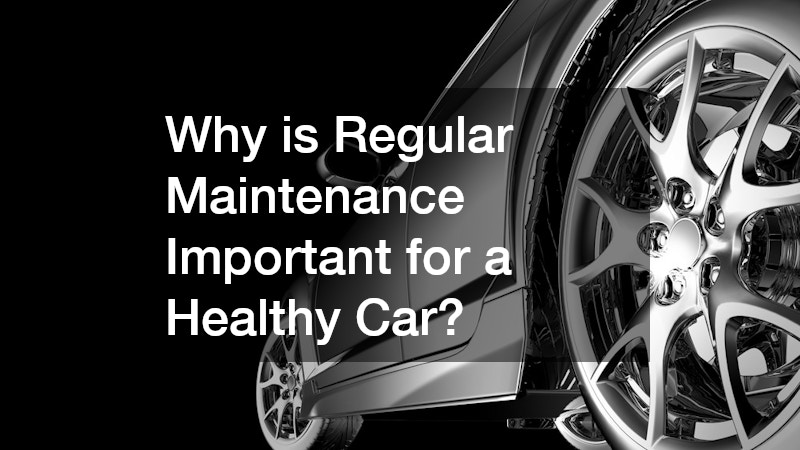The importance of preventative maintenance in maintaining a healthy car cannot be overstated. Auto mechanics often encounter numerous questions from car owners seeking advice on how to keep their vehicles in prime condition. A well-maintained car offers not only reliability but also safety, fuel efficiency, and an extended lifespan. This article addresses the ten most common inquiries auto mechanics receive about preventative maintenance to help you understand how to maintain your car effectively. Whether you’re visiting car repair shops, auto body shops, or consulting with a local auto repair expert, these insights will ensure your vehicle stays in top-notch condition.
1. Why is Regular Maintenance Important for a Healthy Car?

1.1 Extending the Lifespan of Your Vehicle
Regular maintenance is critical to extending the lifespan of your car. Auto body shops frequently see vehicles with significant wear and tear that could have been avoided with timely preventative care. From routine oil changes to brake inspections, every aspect of maintenance plays a role in preventing premature aging of the vehicle. By addressing small issues early, you can avoid larger problems that often lead to costly repairs or even irreparable damage.
1.2 Preventing Costly Repairs
One of the biggest benefits of regular maintenance is the ability to prevent costly car repair bills. Neglecting routine services like tire rotations, coolant checks, and brake fluid replacements can lead to expensive repairs down the line. For example, skipping a simple oil change might result in severe engine damage requiring thousands of dollars to fix. Preventative maintenance acts as a safeguard, keeping your car running smoothly while saving you money in the long term.
1.3 Optimizing Performance and Fuel Efficiency
Preventative maintenance ensures your car operates at peak performance. Tasks such as replacing the air filter or ensuring proper tire inflation contribute to better fuel economy. Auto mechanics emphasize the importance of keeping the engine clean and efficient, as this directly impacts your car’s mileage and overall performance. Optimized performance also means fewer visits to car repair shops for unexpected breakdowns, allowing you to drive with confidence.
2. What Are the Consequences of Skipping Scheduled Maintenance?
2.1 Increased Risk of Mechanical Failures
When you skip scheduled maintenance, the risk of mechanical failures increases significantly. Auto mechanics often see neglected vehicles suffering from engine trouble, brake failures, or transmission issues. These problems not only compromise the vehicle’s functionality but also jeopardize your safety on the road. Regular checkups at local auto repairs shops help identify potential issues before they become serious.
2.2 Decreased Vehicle Safety
Preventative maintenance plays a crucial role in ensuring vehicle safety. Neglecting essential services like auto brake repair or tire maintenance can make your car less reliable in emergency situations. Worn brakes or underinflated tires reduce your ability to stop quickly or maintain control, putting you and other road users at risk. Routine maintenance helps address these concerns and keeps you safe behind the wheel.
2.3 Reduced Resale Value
Vehicles with a history of regular maintenance retain their value better than those that have been neglected. Car repair shops often stress that potential buyers look for service records when assessing a used car. By keeping up with scheduled maintenance, you not only protect your investment but also increase the likelihood of a higher resale value.
3. How Often Should I Change My Car’s Oil for Optimal Health?

3.1 Understanding the Manufacturer’s Recommendations
Every vehicle comes with manufacturer recommendations for oil change intervals. These guidelines are designed to optimize engine performance and longevity. Auto mechanics emphasize the importance of adhering to these schedules, as they are based on your car’s specific needs. For instance, some newer models may require oil changes every 7,500 to 10,000 miles, while older vehicles may need them more frequently.
3.2 Factors Affecting Oil Change Frequency
Various factors influence how often you should change your car’s oil. If you frequently drive in harsh conditions, such as extreme temperatures or dusty environments, your oil may degrade faster. Additionally, frequent short trips that don’t allow the engine to warm up fully can lead to sludge buildup. Consulting with your local auto repairs provider can help determine the best oil change frequency for your driving habits.
3.3 Signs That Your Car Needs an Oil Change
Recognizing signs that your car needs an oil change is essential for maintaining its health. Indicators include dark or dirty oil, increased engine noise, or the oil change warning light on your dashboard. Regular visits to car repair shops or auto body shops can ensure your oil is replaced before it causes damage to the engine.
4. What is the Significance of Tire Maintenance?
4.1 Ensuring Proper Tire Inflation
Proper tire inflation is a cornerstone of tire maintenance. Underinflated or overinflated tires can lead to uneven wear, reduced fuel efficiency, and even blowouts. Regularly checking tire pressure and inflating to the recommended levels can save you from costly car repair bills. Many local auto repairs services offer free tire pressure checks as part of their maintenance packages.
4.2 The Importance of Tire Rotation
Tire rotation ensures even wear across all tires, extending their lifespan and improving overall vehicle performance. Auto mechanics recommend rotating your tires every 5,000 to 7,500 miles. This simple practice not only saves money but also enhances safety by maintaining optimal traction.
4.3 Checking Tread Depth for Tire Health
Tread depth is critical for maintaining grip on the road, especially in wet or slippery conditions. Using a tread depth gauge or the penny test can help you assess whether your tires need replacement. For more thorough inspections, visiting car repair shops or auto body shops ensures your tires are in top condition.
5. How Can I Keep My Brakes in Good Condition?

5.1 Recognizing Signs of Brake Wear
Brakes are one of the most vital components of your car. Common signs of brake wear include squealing noises, a spongy brake pedal, or reduced stopping power. Ignoring these symptoms can lead to more severe issues requiring extensive auto brake repair. Addressing brake problems promptly keeps your car safe and prevents further damage.
5.2 Regular Brake Fluid Check and Replacement
Brake fluid plays a crucial role in transmitting force from the pedal to the brake components. Over time, it can become contaminated or lose its effectiveness. Regular checks and replacements, as recommended by auto mechanics, ensure your brakes function optimally. This simple maintenance task can save you from expensive repairs down the line.
5.3 Importance of Professional Brake Inspections
Professional brake inspections at local auto repairs or car repair shops provide peace of mind. Trained mechanics can identify hidden issues and recommend necessary repairs. By investing in regular brake maintenance, you ensure your vehicle remains safe and reliable.
6. What Role Does Coolant Play in Vehicle Maintenance?
6.1 Preventing Engine Overheating
Coolant is essential for regulating your engine’s temperature. Without adequate coolant, your engine is at risk of overheating, leading to severe damage. Car repair shops often emphasize the importance of maintaining proper coolant levels to avoid costly repairs. Regular checks and top-ups are simple yet effective ways to keep your engine healthy.
6.2 Ensuring Coolant Levels are Adequate
Checking your coolant levels is a straightforward task that can prevent major issues. Auto mechanics recommend monitoring levels regularly and topping up with the correct type of coolant as needed. Consistently low levels may indicate a leak that requires immediate attention from a local auto repairs provider.
6.3 Flushing and Replacing Coolant System
Over time, coolant can become contaminated and lose its effectiveness. Flushing and replacing the coolant system removes impurities and restores its protective properties. This service, offered by most car repair shops, ensures your engine remains cool and operates efficiently.
7. Why Do I Need to Replace My Air Filter Regularly?

7.1 Enhancing Engine Performance
A clean air filter allows your engine to breathe properly, enhancing performance and efficiency. Over time, dirt and debris can clog the filter, reducing airflow and straining the engine. Auto mechanics highlight the importance of replacing the air filter regularly to maintain optimal engine function.
7.2 Fuel Economy and Clean Airflow
Replacing a dirty air filter can improve fuel economy by allowing the engine to work more efficiently. Additionally, it ensures cleaner airflow, which benefits both the engine and the environment. Regular checks at car repair shops or local auto repairs facilities help keep your air filter in good condition.
7.3 Timing for Replacing Air Filters
The timing for air filter replacement depends on driving conditions and manufacturer recommendations. For vehicles frequently driven on dusty roads, more frequent replacements may be necessary. Consulting with your auto mechanics ensures your air filter is changed at the appropriate intervals.
8. What Are the Benefits of Regular Battery Maintenance?
8.1 Checking Battery Health
A healthy battery is essential for reliable vehicle operation. Regular battery health checks, performed at automotive collision centers or car repair shops, ensure it delivers the power needed to start your car and run electrical systems. Identifying issues early prevents unexpected breakdowns.
8.2 Cleaning Battery Terminals
Corrosion on battery terminals can impede electrical connections and reduce performance. Cleaning the terminals during routine maintenance ensures a strong connection and prolongs battery life. Many local auto repairs services include terminal cleaning as part of their battery maintenance offerings.
8.3 Understanding Battery Life Expectancy
Batteries have a finite lifespan, typically ranging from three to five years. Regular testing at car repair shops helps determine when a replacement is necessary. Staying proactive about battery maintenance reduces the risk of being stranded due to a dead battery.
9. How Does Maintaining the Transmission Contribute to a Healthy Car?
9.1 Signs of Transmission Issues
Common signs of transmission problems include difficulty shifting gears, unusual noises, or fluid leaks. Addressing these issues promptly with auto glass repairs specialists or local auto repairs providers prevents further damage and extends the life of your transmission.
9.2 Regular Transmission Fluid Checks
Transmission fluid plays a vital role in ensuring smooth gear changes and preventing overheating. Regular checks and replacements, as recommended by auto mechanics, keep your transmission in top condition. Ignoring this maintenance can lead to costly repairs or even transmission failure.
9.3 Scheduling Professional Transmission Service
Professional transmission services, offered by car repair shops, include fluid changes, inspections, and repairs. Scheduling these services as part of your preventative maintenance routine ensures your transmission remains reliable and efficient.
10. What Should I Know About Exhaust System Maintenance?
10.1 Identifying Exhaust Leaks
Exhaust leaks can compromise your vehicle’s performance and pose safety risks. Common signs include unusual noises, decreased fuel efficiency, and a noticeable odor of exhaust fumes. Addressing leaks promptly with the help of towing services or auto mechanics ensures your vehicle operates safely.
10.2 Importance of a Well-Functioning Catalytic Converter
The catalytic converter plays a critical role in reducing harmful emissions. Regular maintenance ensures it functions properly, contributing to a cleaner environment. Auto mechanics recommend inspections to detect and address any issues with this vital component.
10.3 Addressing Unusual Noises and Odors
Unusual noises or odors emanating from the exhaust system often indicate underlying problems. Prompt attention from car repair shops or local auto repairs providers helps resolve these issues and maintain your vehicle’s efficiency and safety.
Conclusion
Preventative maintenance is essential for keeping your vehicle in optimal condition, ensuring safety, reliability, and efficiency. From regular auto brake repair to timely auto detailing and addressing auto glass repairs, every aspect of maintenance contributes to a healthy car. By understanding and addressing these frequently asked questions, you can take proactive steps to maintain your vehicle and enjoy a smooth driving experience for years to come.



